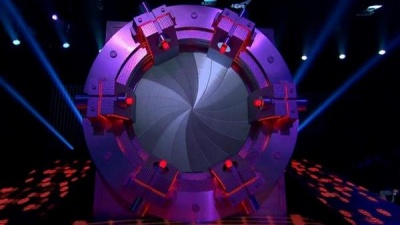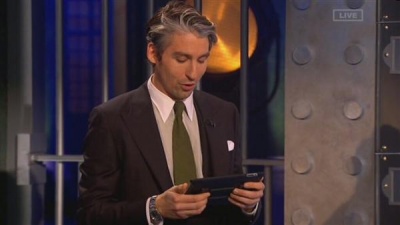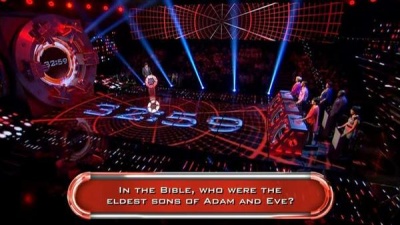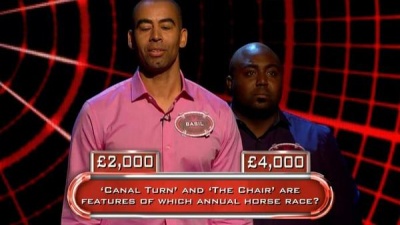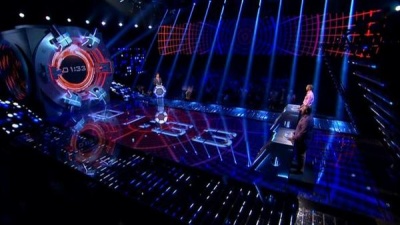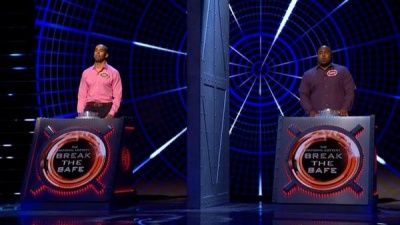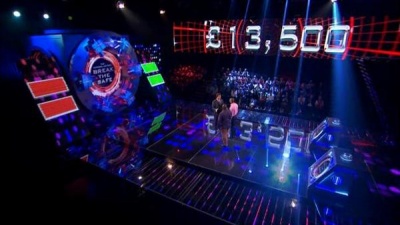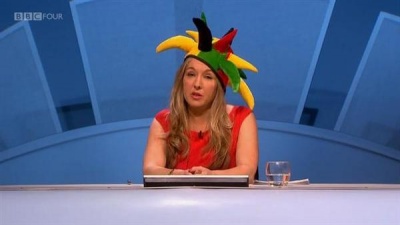Weaver's Week 2013-08-18
Last week | Weaver's Week Index | Next week
The original ending to this week's Week was too hard, so we re-wrote it. See if you can spot the join.
Break the Safe
Thames Scotland for BBC1, from 27 July
Another year, another big-prize game show to wrap around the Lottery Corp's advert, another such show hosted by Nick Knowles. There's been the best-forgotten Guesstimation, there's been the really rather good Who Dares Wins, there's the entirely fine Secret Fortune, there was the one-off The National Lottery Big 7, and there was Millionaire Manor. Oh, no, that was someone else. But we have to go back to summer 2008 and the short-lived This Time Tomorrow to find a new Lottery Corp show that wasn't hosted by Kernick.
On the table for this show is a theoretical cash prize of £100,000. Three pairs of people are in the studio, hoping to get a chance to win at least some of that money. The couples – relatives, friends, workmates – have applied as a couple, they've not been thrown together like on Who Dares Wins. They're introduced with a running line about "have these people got the combination to unlock the safe?"
Ah, the safe. A giant metal thing at the other end of the studio, actually looking a bit like the door to a bank vault, it comes complete with six retractable locks. And a digital readout that can show how much money is in the safe, but usually gives a countdown from 35 minutes to a point near the end of the programme. It's not a strictly accurate countdown, it skips seconds here and there, but it's close enough to appear realistic. When that countdown finishes, the contestants have one second to press their button, open the safe, and win the contents.
In a touch of theatrics, Nick locks the safe, and all the mechanical locks move into place, with a satisfactory clunk. And then, at various points throughout the game, he'll retract one of the locks. It'll move with a satisfactory clunk, which makes good telly. But surely the point of a safe is that it's safe, and people can't just open and close it at whim. You never know what horrible thing might be trying to get recommissioned and get out.
Round one is fast, frenetic, and fun. For this round, one of the players is in control of a buzzer, and the other must take a back seat. Literally: their bit of the stage slides backwards, leaving them about three metres behind their fellow. Nick will ask a question with precisely two correct answers, such as "Who were the two UK hosts of Winning Lines?" The player with the buzzer will press it, Nick will call her name, and she'll shout out one answer, for instance "Phillip Schofield". Nick then calls her team-mate's name, and she needs to give the other correct answer, in this case "Simon Mayo". An error by either player will throw the whole question to one of the other teams; should they also fail, the question dies and the third team doesn't get to play.
In the cut-and-thrust of all this, there's plenty of room for things to go wrong. All too often, contestants will give an answer that's part of the question, such as "Who were the two chancellors before George Osborne?" "George Osborne," pipes up a contestant, perhaps ready to have a philosophical debate over the meaning of the term "before", but more likely not to be listening. And on occasion, we'll get a passage of play like, "Marmalade." "Wrong!" "Marmalade." "Still wrong!" Clearly, Nick could give up all of this showbiz lark and teach junior school children that a wrong answer for Tom is going to remain a wrong answer for Tim, however many times they say it.
Twelve questions at £1000 each, then the roles are reversed, and the other player takes control of the buzzers for twelve questions at £2000 each. The money won by the bottom team is lost from the game; the cash from the top two is taken from the bank in front of the players and transferred into the safe by means of a series of underground tubes beneath the studio floor. So, not only does this safe have an identity crisis, looking like a vault, and not only does it have locks that unlock on the command of a bloke off the telly, but it's got a hole in it through which money can be added. Not so much a safe as a storage box, a sort of money-sheep.
After this frenetic opening, the pace calms down for the remainder of the game. So does the question rate: the first 24 questions have zipped by in about seven minutes, the next ten will take about twenty minutes to get through. Six of them come in round two: here, the player in front can take the question themselves for £2000, or pass it to the player behind for £4000. Obviously, the player in front can't see the facial expression of the player behind, and we guess that the contestants have been told not to pull obvious faces before the decision's made. In theory, this is meant to be a test of strategy, but there's rarely a reason for the player in front to answer the question: only if they're sure they know it and they're sure their partner won't get it should the player in front play.
We clocked that strategy in about two questions, and later ones in the round are for £4000 and £6000, doubling if passed back. Each team has their own set of questions, and can take £24,000 through to the next round. Only the higher scorers will do that, the other pair will receive thanks and be booted very quickly off the set. It's a very modern set, all shiny glass and banks of uplighters, with a massive video display screen beneath the main floor, and another one on the wall behind the audience. Graphics are written in the Bank Gothic typeface, all capital letters and perhaps not the best to read at speed. Still, the whole set (graphics by The Creative Cell, computers by Lumina Displays) is breathtaking, one of the best things about the programme.
After the first commercial for The Lottery Corp, there's one pair of contestants left. They're now given their own individual podium, and four questions. Only one person will play each question, and each person gets to play just two of the four questions. To help decide, the players are given a loose hint to the content of the question. These are sometimes deceptive clues, hinting at a pun in the question rather than the topic of the answer. A correct answer here is worth either £10,000 in the bank, or an extra second in the endgame. The players choose which they'd prefer.
And then, with the clock reaching about two minutes, Nick tees up the endgame. Four locks are released, now the players get to remove the other two. The players are split by a plastic wall, and given a button of their own. When it reaches 30 seconds, the countdown clock will disappear in a minor chord. The players must then count the remaining time, and press their button no more than one second after it hits zero. Press before the clock hits zero, and they leave with nothing. Both press within that second, they can release the lock and claim the loot. And that's where the "extra second" option in the previous round comes in – the players can expand that window from 30-31 seconds, potentially all the way to 30-35 seconds.
Now, we know that Thames has been hawking this format around for many years. Pilot episodes have been filmed with Jake Humphrey last year, and with Dick and Dom circa 2007 when they were heading for Saturday night telly. The problem remains that it all boils down to someone singing the Countdown clock music in their head. Or someone reciting a piece of verse in their head. Or someone doing something in their head. Counting to 30 is not a television spectacle at the best of times: when it's done without movement, without sound, it's simply dead air.
So they give Nick a speech to add in voice-over, saying how the audience has had their watches and mobile phones removed, how the studio clocks are covered and concealed, how the million pounds has been brought to the top-secret location. All of this is fine, but it means we cannot possibly play along with the ending at home. Want to know how good you are at measuring 30 seconds in your head? Don't try to find out while watching the show asking its contestants to measure 30 seconds in their head.
While the results are counted and verified, there's another commercial from The Lottery Corp. Then we're back for the result. Nick asks, "Did Julie hit her button in the first second?" An interminable pause before we find out, no, Julie did not hit her button in the first second. "Did Simon hit his button in the first second?" There's another interminable pause before we find out, no, Simon did not hit his button in the first second. And so it goes on, and goes on, and potentially goes on for ten repetitions.
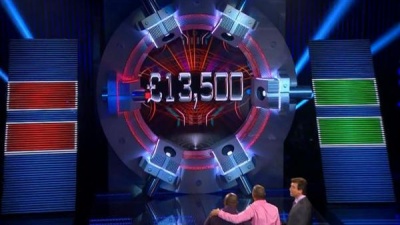 A box for every second? This isn't Celebrity Squares. More's the pity.
A box for every second? This isn't Celebrity Squares. More's the pity.
This is tedious. This is not the best way of doing things. A less toe-curlingly snoozesome way of presenting the results is to have split-screen graphics: one corner showing Julie's hand over her button, one corner showing Simon's hand on his button, half the screen with a reaction shot of contestants and Nick watching the footage, and with a timer showing somewhere prominent, marked off in thousandths of a second. Start at precisely zero, and play back in super-duper slo-mo. Stop the tape whenever someone presses their button, allowing Nick to discuss matters. And, if necessary, spool back to find someone who pressed early.
And we'll spool back in our review, because immediately before the last round of questions, a new rule was introduced. There was no fanfare, there was no picking up cards, just the statement that "if one of you presses in time, you'll win half the money". If we're to believe last week's Sunday newspapers, this rule was inserted very late in the recording schedule. How late? After the winners of the games had been determined, after they'd all played the final round, and after none of them had won under the "both press" rule.
The fact that some players would have won had the new rules been in effect last time, but didn't on the re-shoot, is very unfortunate. On the other hand, they lost under the first set of rules, and still lost under the second set of rules. We do have a problem with the way players were told "don't tell anyone", because a lack of transparency led to serious problems a few years ago. What's happened is fair, in that the rules have been upheld, and it's just, in that the same rules have been applied to everyone.
Our problem with this re-shoot incident is simply that it took place, that it needed to take place. We can't believe that Thames didn't know their game was hard, and there was a fair chance it would produce no winners in eight shows. One person counting to 30 accurately is difficult enough: two people doing it at the same time, under studio pressure, is remarkably tough.
The tradition in Lottery Corp shows is that most shows will produce a winner of something. Jet Set promised that one of the seven people would win a desirable prize, but who. Secret Fortune ensured that its winners would leave with something, in a large range of prizes. Winning Lines asked who and what, Guesstimation asked why. There are episodes of Who Dares Wins and In It to Win It where there are no prizes, but these are rare. Break the Safe promised an eight week slog where no-one would win the prize, where everyone would leave with nothing. It's not even as though the game is compelling, as One Versus One Hundred was.
So we get the worst of all worlds. A game that is nearly impossible to win, and the fix is to retrospectively invent a half-win. It's bad practice, done to rescue bad television.
This Week And Next
Loughborough took on Clare Cambridge in the University Challenge studio. The game is summed up in the third starter:
- Q: Denoting a beast of burden, what two final letters link words meaning an infectious disease eradicated in 1980, an event...
- Mark Chonofsky, Clare Cambridge: Ox.
Clare sailed through a round of surnames shared by sportspeople and intellectuals, they spotted the club crest of Newcastle United (a club giving 5654%), and got confused by a starter asking for a city whose inhabitants anagram into a drug. Paris, as in Parisian and aspirin, apparently. Not sure how that works. Oh, it's all in French – Parisien and aspirine. A subsequent starter gave the three largest islands of Scotland and asked for the next largest. Only Connect wouldn't like this, it's too difficult to know from Lewis and Harris that the answer is Mull. And we'll take Wrong Answer of the Week.
- Q: What name is given to the effective mass associated with the motion of the displacement vector between the bodies?
- A: Jeff.
Sorry, that was absolutely rubbish, would you like to go back and re-shoot it? University Challenge is reputed to ask quite a few more starters than make it to air – last year, we think almost a whole show got trimmed out because the questions were too hard for the competing teams. Something similar happens around the second visual round, when there was a run of three panel-beaters, and possibly some more trimmed. There was an exchange that went "Hectare" No! "Hectare" Still no! Break the Safe is not a guide to good practice. Loughborough had managed to tie the game on a couple of occasions, and pulled within five towards the end but never looked like winners, and Clare won by 195-155.
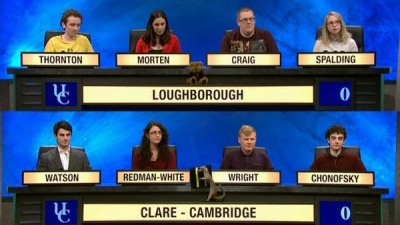 Loughborough: Ally Thornton, Kathy Morten, Grant Craig, Katie Spalding
Loughborough: Ally Thornton, Kathy Morten, Grant Craig, Katie Spalding
Clare Cambridge: Sam Watson, Carys Redman-White, Tom Wright, Mark Chonofsky
Monday was a bad day for bankers. Not only was there a banking student on the defeated Loughborough side, but the stingy moneyman on Deal or No Deal found himself compelled to write a very large cheque. Paddy Roberts, a teenager from Wigan, bagged £250,000 from Endemol's dream factory.
Mastermind reached heat 2. As we did last year, we'll present contenders in the order they came to the chair for their second round.
- Andrew Forsyth (Green Lantern comics) had a set of questions that could have been in Greek for all we understood them. The contender seemed to expect something different from the typical and tedious plot minutiae, finishing on 5 (2). Perhaps secure in the knowledge that he couldn't win, the contender gave answers to most of the questions, many of them correctly. The final score of 15 (4) gave him a brief sniff of the lead.
- Lauren White (Catherine Howard) had a good specialist round on Henry VIII's wife, her score of 11 (0). The general knowledge round picked up points without ever gaining a great head of steam, closing on 23 (4).
- Brian Daugherty (Life and Works of Robert Hooke) took questions on the physicist and inventor of laws, reasoning his way to 11 (2). His round suffered from a serious breakdown, barely scoring for a minute in the middle, for a total of 18 (7).
- Colin Foster (British summer Olympic medallists 1960-2008) gets a round concentrating more on gold medals, which is entirely reasonable, as the contender reaches 14 (0). Ten to win, so all he had to do was keep the scoreboard ticking over and the next round awaited. The contender achieved this, and went on to make the best general knowledge round of the night. 26 (0).
So Colin Foster joins us in the second round, next year. We don't expect that Lauren White's 23 will be enough to bring her back as a high-scoring loser.
Only Connect finished last week, though there's a new series set to launch in about a month. If you have a burning desire to get things wrong on BBC4, applications for next year's series are now being taken. Last time, would-be contestants teamed up with the organisational octothorpe #connect3.
Our site editor has a new blog, Play Cheat Win. The subtitle is "fair and unfair ways to become a champ", and that's pretty much what it covers. The opening post has observations, hints, tips on the classic game of Scissors-Paper-Stone.
Channel 4 continues to celebrate its 30th birthday with a short season of revival programmes. Amongst the shows to be coming back is quickfire quiz Fifteen-to-One, this time hosted by Adam Hills, who claims to be a comedian from Australia. This will either lead to a light entertainment comedy discussion programme loosely based on the ultra-slick quiz, or it'll die faster than Lucky Sexy Winners. And annoying people like us who note that Channel 4's 30th birthday was actually last year, we'll keep quiet.
Selected BARB ratings for the week to 4 August, where Celebrity Masterchef was the top game show, with 5.1m viewers. Break the Safe had 4.55m for its concluding part, and there were 3.8m viewers for the Your Face Sounds Familiar final. Tipping Point wasn't affected by The Zoe Ball Chat Show, registering 3.75m. University Challenge took 2.7m viewers, 8 Out of 10 Cats Does Countdown 1.85m, and the Big Brother eviction show 1.95m. Deal or No Deal is back in Channel 4's top thirty, with 950,000 viewers; Only Connect had 1.18m on BBC4. The host's sartorial elegance pays off.
Elsewhere on digital channels, it's 710,000 for Hell's Kitchen on ITV2, 505,000 for Come Dine on More4, 430,000 for Mock the Week on Dave, and 395,000 for Britain Ireland's Next Top Model on UK Living. There were 55,000 viewers for Fort Boyard on Disney XD, where they do something very clever. Limited to one advert break in a children's show, they air the first half of the contest, run some credits and more ads, then the second half as a separate programme. Genius.
More on regulatory loopholes next week, as we look at Big Brother and matters arising.
Coming up in the week of 24 August: a new series of Celebrity Juice (ITV2). At a similar level of incomprehensibility, a week of Only Connect specials on BBC2. Three Champion of Champions matches, and the games against Eggheads and Mastermind champs. We appreciate that the BBC2 audience doesn't quite know how hard this show is, but might we start them on slopes that are a little more slopey, and a little less like a sheer cliff?
The Great British Bake Off returns this week (BBC2, 8pm Tue), so does Street Dance Stars (CBBC, 9am weekdays), and there's a new run of Celebrity Big Brother (C5, 9pm Thu); the civilian series ends on Monday. The Satellite Channel has new series of A League of Their Own and Don't Sit in the Front Row (Fri from 9pm). A couple of documentaries on the steam wireless: Deal or No Deal alumnus Naughty Boy gets a profile on Radio 1Xtra (9pm Sun), and Stuart Maconie has his say on The X Factor and other talent shows (Radio 2, 10pm Wed). Radio people such as Michael Buerk and Anneka Rice on Pointless Celebrities (BBC1, 5.35 Sat); Alex Jones and Celebrity Big Brother's Jack Dee on That Puppet Game Show (BBC1, 6.25 Sat), and Alex stays on for I Love My Country.
To have Weaver's Week emailed to you on publication day, receive our exclusive TV roundup of the game shows in the week ahead, and chat to other ukgameshows.com readers, sign up to our Yahoo! Group.


